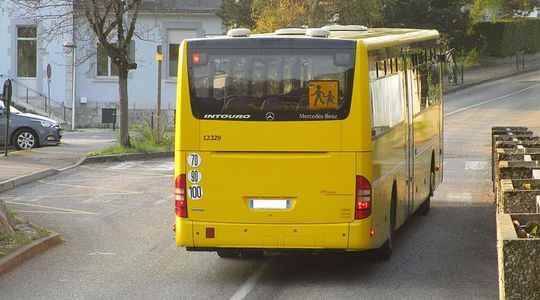It is “a priority” for the government, a concern for parents. And a call for help repeated many times this summer, and the previous ones. According to the National Federation of Passenger Transport (FNTV), several thousand school bus drivers are missing, ten days before the Back to School. “More than 7,000 positions remain to be filled, according to the figures we have”, specifies to L’Express Ingrid Maréchal, general delegate of the organization.
The shortage of drivers varies by region, but none is really spared, says FNTV. Between 900 and 1,000 were missing in Auvergne-Rhône-Alpes, 700 in Pays de la Loire and 6,000 in New Aquitaine, the three main regions most affected last June, according to the count made by FNTV. “We will recruit until the last moment, but we will not be able to find more than 2,000 people in 10 days”, regrets the delegate.
Contacted by L’Express, the Regions of France association transmits a much lower count: “After the recruitments and intensive training carried out in recent times, we still observe between 3,500 and 4,500 positions under tension”, nuances the organization, which represents the regions, entities which manage school transport, since 2019. “We are optimizing as much as possible. Some circuits will not be carried out, but we are far from the figure of 20% of pupils concerned mentioned by the FNTV”, corrects a member of the ‘organization.
Still, a few weeks away from the start of the school year, the situation is of particular concern to parents of students. “It is out of the question that parents should suffer the consequences” of the lack of drivers, warned Laurent Zameczkowski, vice-president of Peep, an association of parents of students, interviewed by AFP, on August 19. “It is a public service that must be provided,” he insisted.
Become a “school airline pilot”
Every year the sector struggles to recruit, despite the initiatives. Here, public display in front of the headquarters of a transport company. There, a call to become a “school airline pilot“, when the company does not offer a conversion by the sea, in one of his dozens of social media posts. Almost everywhere, jobs dating. “We are looking for men, women of all ages, the training is fully supported by Pôle emploi and companies. It is an insured CDI, close to home”, underlines Ingrid Maréchal.
The representative ensures that everything is done to solve the problem. “Operating agents sometimes have a D permit, so some are mobilized to plug the holes, but this puts the companies under very high pressure. This cannot last. The whole of last year was also very complicated. And we are worried about a possible new wave of Covid-19 which could increase absenteeism. We need long-term solutions”, insists the FNTV delegate.
The Minister of Labor also ensures that he is working on solutions. Meetings were held with the Ministers of Education and Transport, as well as employers’ organisations. Another is scheduled for Wednesday, according to our information. And tracks have already been revealed, in particular on July 27th. Asked by the deputies, Olivier Dussopt then mentioned the possibility that the same driver would make “several school bus tours” in order to transform his contract into full-time.
Line reorganizations in shambles
But the parents of students fear that these extended tours will be at the expense of certain stops that could be considered detours. These route changes could also disrupt class schedules and the organization of teachers. As for shifting the time slots of the students, to allow the same driver to make several routes, “for the moment, the Ministry of Education has not followed up because this poses major reorganizations”, specifies Ingrid Maréchal .
Another track envisaged by the government: “the State is ready to finance training to allow certain drivers to carry out complementary activities”, declared Olivier Dussopt, still on July 27, at the National Assembly. Aspiring drivers are often put off by the schedules of the job: a few hours in the morning and evening, which only bring in a few hundred euros a month. Last year, the state opened the D permit to those over 18, to attract young people, without this being enough to compensate.
A situation well known to the unions: “We find ourselves with drivers paid at minimum wage while they work a 12 or 13 hour shift for four hours of actual work and earn 800 euros per month”, denounced Patrice Clos, secretary general of FO-Transports, to AFP. He calls for better calls for tenders from the regions, to guarantee decent wages for drivers.
Hours and wages that put off
According to the unions, the Covid-19 crisis has increased the labor shortage tenfold. “We are fully in the consequences of the health crisis”, estimated Jean-Marc Riviéra, general delegate of the OTRE (Organization of European road transport operators), to AFP. With the shutdown of the activity, the drivers turned to other jobs and “when it was necessary to leave, not all the drivers returned to their initial job”.
Jean-Marc Riviéra suggests facilitating the rules surrounding the accumulation of employment and retirement to promote the employment of seniors. And also proposes to “promote the accumulation of unemployment rights with an activity” as a driver because often, “working part-time is to make you lose your rights”. The companies could also try to accentuate their traditional recruitment with former soldiers – the latter are holders of the D license allowing them to drive cars – but this recruitment channel is greatly diminished, according to professionals in the sector.
Each year, around 1.2 million students reach their school, college or high school using a school bus, according to figures provided to AFP by the Association of Regions of France (ARF). For the moment, professionals in the field and the public authorities maintain that everything will be done to prevent certain deserts from being deleted. But this morning on RMC, François Bonneau, vice-president of Regions of France no longer excluded that certain young people were “not transported”.
